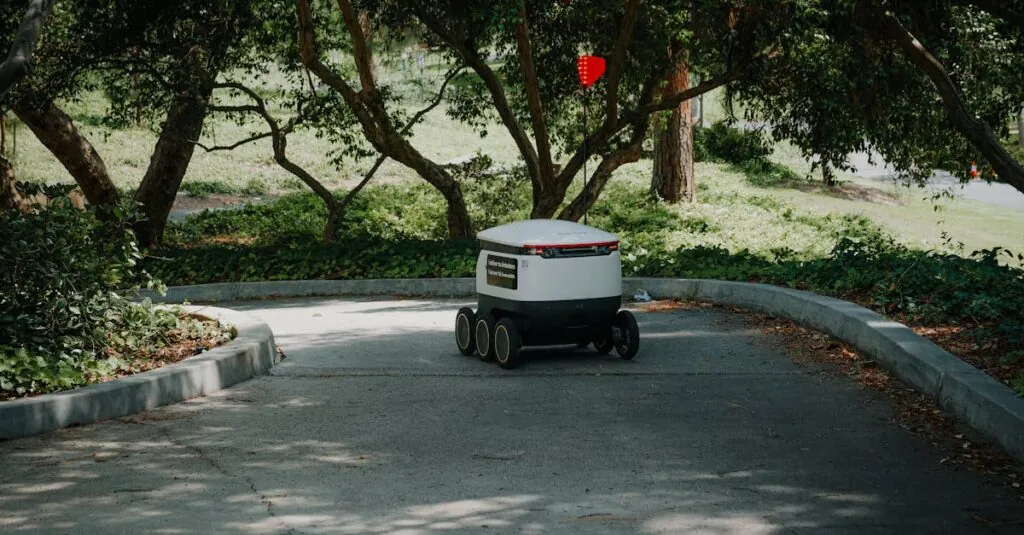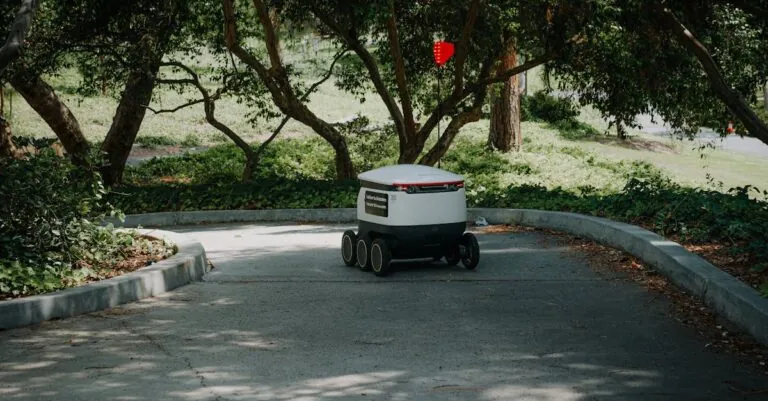Table of Contents
ToggleIn a world where traffic jams can turn a 20-minute delivery into a three-hour odyssey, logistics companies are turning to AI like a caffeine-fueled office worker on a Monday morning. This tech wizardry isn’t just about fancy algorithms; it’s about transforming the way goods move from point A to point B—without the usual hiccups.
Imagine a logistics system that predicts delays before they even happen, optimizing routes faster than you can say “where’s my package?” With AI at the helm, companies can streamline operations, cut costs, and even make their drivers smile—because who wouldn’t want to avoid that dreaded rush hour? Buckle up as we dive into how AI is revolutionizing logistics, making it smarter, faster, and a whole lot more efficient.
Overview of AI for Logistics
AI in logistics enhances operational efficiency and addresses key challenges faced by companies. Integrating AI technology allows businesses to predict traffic delays accurately, leading to timely deliveries. Algorithms analyze vast datasets to optimize delivery routes based on real-time conditions.
Cost reduction emerges as a significant advantage of AI implementation. By automating routine tasks, companies can allocate resources more effectively, resulting in lower operational expenses. Improved warehouse management systems leverage AI for inventory tracking, minimizing losses from overstock or stockouts.
Driver satisfaction increases through AI-driven solutions. Enhanced route planning reduces time spent on the road, enabling drivers to complete tasks efficiently. Predictive analytics helps in anticipating maintenance needs, reducing downtime for vehicles.
Data-driven decision-making plays a critical role in logistics operations. AI tools provide actionable insights, enabling managers to make informed choices regarding fleet management and resource allocation. Enhanced visibility throughout the supply chain enables quicker responses to disruptions.
Sustainability also benefits from AI integration. Optimized logistics routes contribute to reduced fuel consumption, lowering overall carbon footprints for companies. Utilizing AI for demand forecasting allows logistics providers to adjust operations according to demand fluctuations, improving overall sustainability.
Adopting AI technology is transforming the logistics landscape significantly. Enhanced operational efficiency, cost savings, and improved customer satisfaction redefine traditional logistics processes. AI stands as an essential component for logistics companies aiming to remain competitive in a rapidly evolving market.
Benefits of AI in Logistics
AI offers numerous advantages for logistics companies, primarily enhancing operations and improving overall performance. Below are key benefits that highlight the transformative impact of AI technology on logistics.
Increased Efficiency
AI technologies boost efficiency in logistics operations through real-time data analysis. Predictive algorithms assess traffic patterns and weather conditions, enabling companies to make informed decisions. Intelligent routing systems reduce average delivery times and improve on-time performance. Overall, automation of routine tasks enables personnel to focus on strategic initiatives. Streamlined warehouse operations optimize inventory management, ensuring timely access to products. Moreover, the integration of AI fosters better communication across all logistics channels, allowing for smoother coordination.
Cost Reduction
Companies experience significant cost reductions by incorporating AI in logistics. Automation minimizes manual labor, resulting in lower operational expenses. Predictive maintenance tools help prevent vehicle breakdowns, reducing both repair costs and downtime. Enhanced resource allocation optimizes fleet utilization, adding to savings. AI-driven inventory systems improve tracking accuracy, reducing losses associated with overstocking or stockouts. Companies also benefit from fewer delays, directly contributing to profitability. The overall efficiency improvements lead to a leaner operational model, reducing waste and maximizing profit margins.
Applications of AI in Logistics
Artificial intelligence enhances logistics operations across various dimensions. Companies leverage AI technologies for improved efficiency and streamlined processes.
Supply Chain Optimization
Supply chain optimization benefits significantly from AI implementation. Algorithms analyze data from multiple sources to forecast demand accurately. These insights enable companies to maintain optimal inventory levels, eliminating excess stock and reducing waste. AI also improves supplier relationship management, leading to stronger partnerships and timely deliveries. By predicting trends, logistics providers adapt quickly to market changes, enhancing their competitive edge.
Predictive Analytics
Predictive analytics utilizes AI to transform data into actionable insights. Companies analyze historical data patterns to forecast potential disruptions in supply chains. This foresight allows businesses to take proactive measures, minimizing delays and maximizing efficiency. AI algorithms also assess real-time data from vehicles and shipment conditions to adjust routes dynamically. As a result, logistics companies achieve a more agile response to unforeseen challenges while maintaining on-time delivery rates.
Autonomous Vehicles
Autonomous vehicles revolutionize the logistics landscape. These self-driving systems leverage AI to navigate safely and efficiently in various environments. By reducing human error, companies enhance safety while increasing delivery speeds. Fleet management benefits as autonomous vehicles communicate seamlessly, allowing for real-time adjustments to delivery routes. AI-powered autonomous solutions also contribute to sustainability by optimizing routes for fuel efficiency, minimizing carbon emissions along the way.
Challenges in Implementing AI for Logistics
Implementing AI in logistics presents several challenges that need careful consideration.
Data Privacy Concerns
Data privacy concerns arise as companies handle sensitive information. Protecting customer details, shipment data, and financial transactions requires robust security measures. Legal regulations such as GDPR and CCPA mandate strict compliance, which can complicate AI adoption. Companies must invest in advanced encryption and data anonymization techniques to safeguard privacy. Without these considerations, businesses risk jeopardizing customer trust and facing substantial penalties.
Integration with Existing Systems
Integrating AI with existing systems poses significant challenges for logistics companies. Many organizations rely on legacy software that may not support advanced AI solutions. Compatibility issues can lead to data silos, which hinder efficiency. Transitioning from traditional methods to AI-driven processes requires careful planning and a well-defined strategy. Staff training plays a crucial role in this transition, ensuring everyone is equipped to work with new technologies. Establishing seamless communication among systems enhances data flow, ultimately improving overall logistics operations.
Future Trends in AI for Logistics
Automation continues to shape the logistics landscape as companies embrace advanced AI technologies. Increasingly, predictive analytics is revolutionizing inventory management, allowing firms to maintain optimal stock levels based on real-time data. Enhanced routing algorithms play a vital role in reducing delivery times and improving fuel efficiency, further emphasizing the need for intelligent logistics solutions.
Sustainability is becoming a priority for logistics firms. AI-driven route optimization not only lowers costs but also minimizes environmental impact by cutting down on fuel consumption. Forward-thinking organizations are leveraging AI to track carbon emissions more accurately, aligning their operations with global sustainability goals.
Emergence of autonomous vehicles signifies a major shift in logistics operations. Companies are integrating these AI systems to boost delivery speeds while enhancing safety measures on the road. Growth in this sector is also paving the way for more efficient last-mile delivery solutions.
Moreover, AI is improving supply chain visibility and agility. Real-time tracking systems, powered by AI, provide stakeholders with actionable insights, enabling quicker responses to disruptions. Data integration across various platforms remains crucial, as companies strive to eliminate silos that hinder efficiency.
Adoption of machine learning continues to facilitate advanced demand forecasting. With access to vast datasets, firms can pinpoint trends and anticipate market fluctuations more accurately. As the industry evolves, training personnel to work alongside AI systems becomes essential, ensuring smooth transitions and maximizing the benefits of these technologies.
Innovation in AI tools for logistics drives competitive advantages in a crowded marketplace. Embracing these trends prepares companies for future challenges, enabling them to navigate disruptions effectively while enhancing overall operational efficiency.
Embracing AI in logistics is no longer optional; it’s essential for companies looking to thrive in a competitive landscape. The technology not only enhances operational efficiency but also drives cost savings and improves driver satisfaction. As logistics firms integrate AI solutions, they position themselves to respond swiftly to disruptions while optimizing their routes for sustainability.
The future of logistics is bright with AI at the helm. By harnessing data-driven insights and automation, companies can streamline their operations and meet evolving customer demands. Those who invest in AI today will undoubtedly reap the rewards tomorrow, ensuring they stay ahead in an ever-changing market.







